Nearly a million Hong Kong residents flooded the streets of the city on Sunday, demanding safeguards for their longstanding democracy against the Communist Party of China, the largest crowds to show for rallies since the summer.
Sunday’s rally was, also echoing the initial marches of the 2019 protest movement, largely peaceful and completely legal as police chose not to attack those assembled as they had become accustomed to in recent months. The rally observed World Human Rights Day as well as the six-month anniversary of the protests:
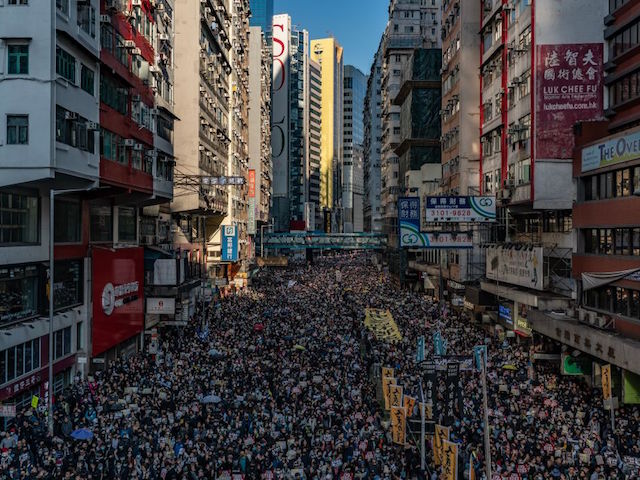
Pro-democracy protesters march on a street as they take part in a demonstration on December 8, 2019, in Hong Kong. (Anthony Kwan/Getty Images)
#NOW #HongKong – 6 months on, HongKongers are still here.
Hundreds of thousands of #HongKongProtesters attending Human Rights Day rally organized by @chrf_hk right now. All six lanes filled with sea of black. #HongKongProtests pic.twitter.com/ClaN59sU9D— Phoebe Kong 江穎怡 (@phoebe_kongwy) December 8, 2019
Hongkongers began taking to the streets in June against a proposed law that would have allowed China to extradite anyone present in the city if the Communist Party found they had violated repressive communist laws, a violation of the city’s “One Country, Two System” policy that bans enforcing communism there. The Hong Kong government ceded to that demand, but residents have continued to demand other safeguards against communism in light of the looming threat of an increasingly colonialist Chinese state, including the right to directly elect their lawmakers and an independent probe into police brutality against protesters.
The protesters are observing June 9 as the official start date of their movement, making Monday their six-month anniversary. Hong Kong residents rallied in the thousands shortly before that, however, on June 4 to observe the 30th anniversary of the Tiananmen Square massacre in one of the few places under Beijing’s control where it is legal to know that it occurred.
The Civil Human Rights Front, the group that has typically filed for legal licenses to stage public assemblies, received a letter of no objection, the city’s name for a permit, for the march Sunday for the first time in months without interruption. The group received one for the march last week – which attracted 380,000 people – but police rescinded it and started attacking protesters with tear gas and pepper spray an hour into the march, despite its legal right to occur.
Police did not similarly intervene on Sunday, apparently, a tactic directed by Beijing after Hong Kong Police Commissioner Chris Tang visited the capital city this weekend. Tang returned to Hong Kong for the protest Sunday, and police did not attack protesters, resulting in no significant violence.
The protest attracted large numbers of families, resulting in crowds full of children and the elderly and strollers prominently rolling by with young, black-clad marchers:
Infants, elderly and people with physical injuries all joined Sunday’s massive World Human Rights Day march on Hong Kong Island, so far a peaceful affair.
Photo: Jimmy Lam / USP; May James / HKFP. #hongkong #HongKongProtests #china #antiELAB pic.twitter.com/wTV4q58gKt
— Hong Kong Free Press (@HongKongFP) December 8, 2019
The protesters held up signs that made clear their objection was specifically to Chinese communism, that they were not just objecting to police abuses in Hong Kong, but demanding international accountability for China’s human rights abuses against Muslims in western Xinjiang province.
China has built more than 1,000 concentration camps in Xinjiang, housing between one and three million Uyghur, Kazakh, and Kyrgyz Muslims. Survivors say they are subject to murder, rape, extensive torture, organ harvesting, and slavery, in addition to indoctrination into worshipping Communist Party dictator Xi Jinping:
A set of three banners reads: “Yesterday’s Xinjiang and Tibet, today’s Hong Kong,, tomorrow’s Taiwan”.
Photo: Apple Daily. #hongkong pic.twitter.com/XLyLwwatB2
— Hong Kong Free Press (@HongKongFP) December 8, 2019
“Stand with Uyghurs, Stand with #HongKong”, chants the speaker from the Civil Human Rights Front’s vehicle during the march.
Photo: HKFP. pic.twitter.com/aFIVQ9pPBF
— Hong Kong Free Press (@HongKongFP) December 8, 2019
Jimmy Sham, Hong Kong district councilman and Civil Human Rights Front official, told the Hong Kong Free Press (HKFP) that accountability for police brutality is on the top of the protesters’ demands, given the disproportional violence officers have used against those demanding democracy.
“We hope that Chief Executive Carrie Lam will set up a bona fide independent commission of inquiry,” Sham said.
Other protesters highlighted universal suffrage – currently, a coalition of China-controlled special interests choose who gets a seat on the Legislative Council seat – as a solution to communist threats from the city and Hong Kong Chief Executive Carrie Lam taking any responsibility for the half-year unrest in the city. Some branded Sunday’s protest a “last chance” for Lam.
Lam has refused to resign, though Reuters published secretly recorded audio in September in which she said she wanted to resign but China would not allow her:
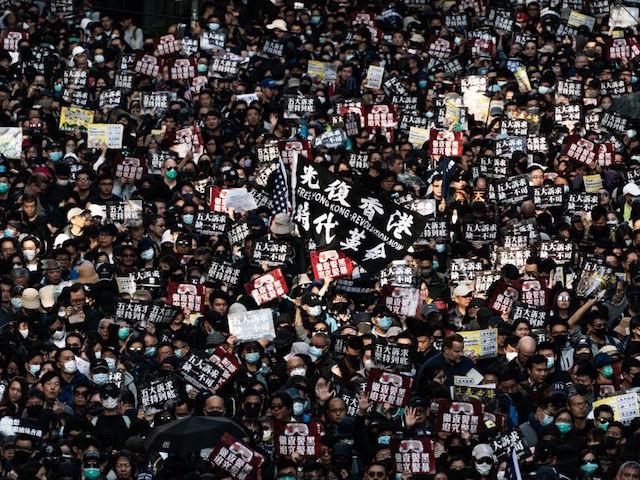
Pro-democracy protesters march on a street as they take part in a demonstration on December 8, 2019, in Hong Kong. (Anthony Kwan/Getty Images)
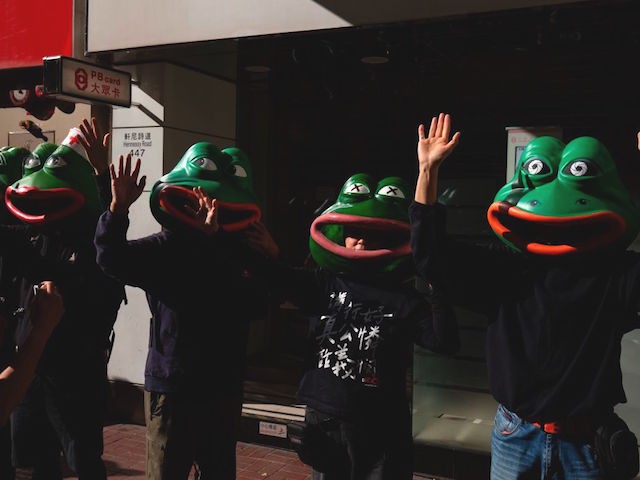
People wearing masks depicting Pepe the Frog, a character used by pro-democracy activists as a symbol of their struggle, gather before the ‘Human Rights Day’ rally from Victoria Park to Chater Road in Hong Kong on December 8, 2019. (Alastair Pike/AFP)
Despite the overwhelmingly peaceful nature of the protests, Hong Kong’s government alleged in a statement that “violent and illegal acts” occurred, specifically sighting small fires and graffiti left in front of Hong Kong’s two highest courts.
“Any attack and smear against the Judiciary would cause enormous damage to the rule of law in Hong Kong, which is unacceptable to the whole community. The HKSAR [Hong Kong Special Administrative Region] Government severely condemns the acts,” the government said in a statement.
The Chinese propaganda newspaper Global Times attempted to brand the peaceful protest as a “riot,” titling its report on the protests “Rioters Descend into Hong Kong Streets.” Even the Global Times, however, could not deny that “it was generally peaceful as the local government claimed.” The newspaper abstained from offering an estimate of the number of people attending.
Last week, the Global Times promoted a video game made by the Communist Party in which players can assault specific Hong Kong protesters, including individuals like Demosisto Secretary-General Joshua Wong, with baseball bats and other weapons.
As in the past, the government also severely underreported the size of the peaceful march. While the Civil Human Rights Front counted more than 800,000 people, Hong Kong police claimed that only 183,000 people took to the streets. Similarly, police claimed the nearly 400,000-strong crowd that organized last week only attracted 16,000 people. Hong Kong protest leaders have in the past posted videos of Hong Kong police counting the crowds with clickers, overtly limiting the numbers by clicking much slower than the speed of people passing by them.
The Hong Kong protests peaked in size in June, attracted two million of the city’s seven million residents. The crowds Sunday were the largest in months, however, galvanized by President Donald Trump’s signing the Hong Kong Human Rights and Democracy Act shortly before Thanksgiving. The act protects protesters seeking U.S. entry visas and requires annual reviews of the state of democratic norms on the city; an unsatisfactory report could result in the city’s losing its special trade status:
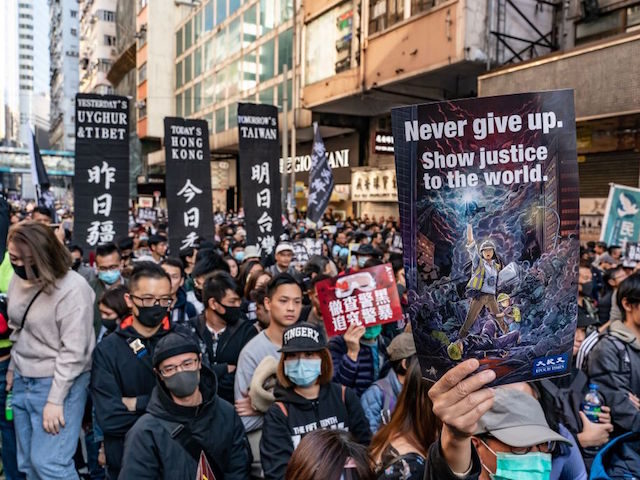
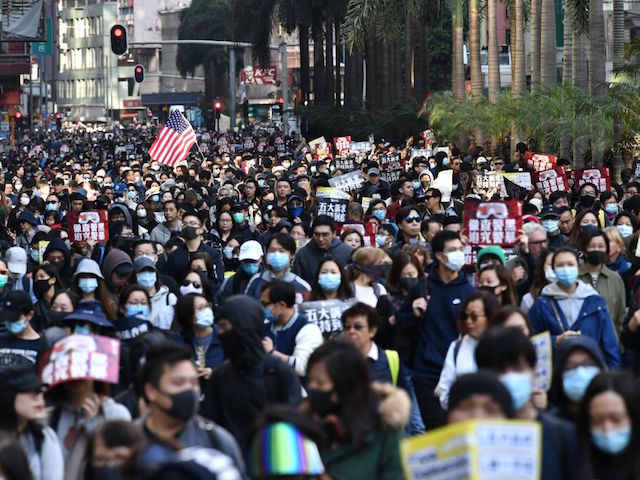
COMMENTS
Please let us know if you're having issues with commenting.